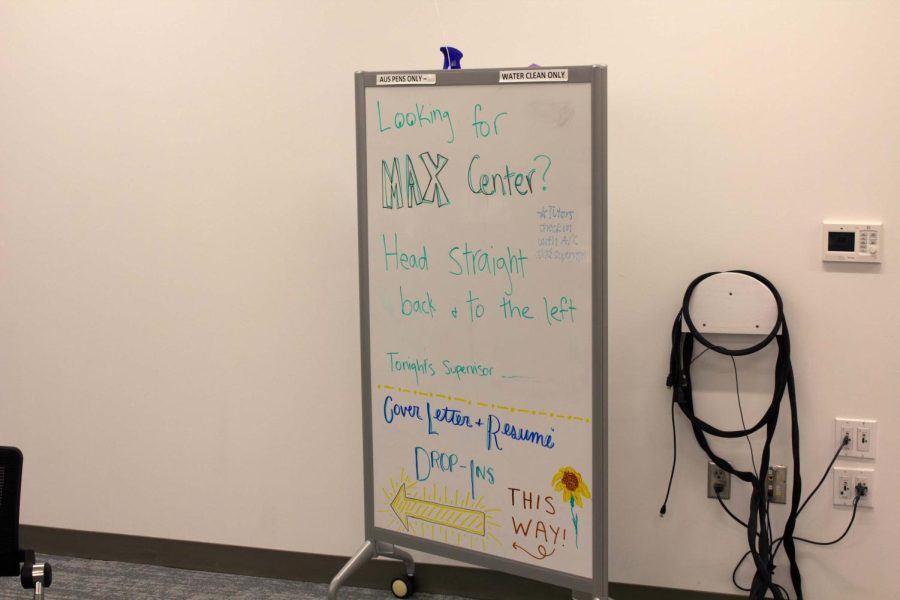Open letter: unlearning white supremacy in writing
March 24, 2022
We are writing to Macalester instructors as some of the writing tutors of the Macalester Academic Excellence (MAX) Center. As peer tutors, we are intimately acquainted with the myriad of ways writing is taught at this college. We read feedback, we hear students’ stories, and we hand students tissues and offer encouragement when academic writing becomes a source of pain and stress. Along with the full-time writing counselors, we also meet every week to discuss writing pedagogy in order to inform our own practices as tutors. We understand the gravity of our words, actions, and interactions with the students we see in the MAX Center, and we want to ensure we center harm reduction and antiracism in our work with them. We do this as students in community with other students, and because those of us who are BIPOC and international student tutors have experienced harmful writing pedagogy firsthand. We believe the MAX Center should not be a place where students feel stigmatized based on their writing ability, nor a place for instructors to offload the work of writing instruction.
Because we are privy to the emotional and intellectual damage that implicit bias and linguistic racism cause, we wanted to share our perspective on what we see in the MAX Center after you’ve put away the red pen. While it is uncomfortable to confront the racism embedded in one’s writing pedagogy, the reality is that we all exist within an education system that upholds white language supremacy, devaluing and causing harm to multilingual and BIPOC writers. We hope that in reading and internalizing the contents of this letter, instructors might recognize these harmful patterns in their own practices and use the resources we provide to reimagine what writing in the classroom can and should be.
When we say white language supremacy, we mean the perpetuation of white American language conventions, or Dominant Academic English (DAE), as the preferred and standard discourse across educational institutions. We use the term DAE to refer to an uncodified, inconsistent, and elusive set of conventions and written accent proposed as an “equal opportunity” tool for student advancement. No one can quite define what they mean when they say “standard English” because English is a living language whose constant evolution resists codification and standardization. White language supremacy functions to permanently designate certain people’s communication as inferior. No matter how these individuals (BIPOC and international students in this case) communicate, their words are subject to scrutiny from the distorted gaze of a white supremacist system. Even if DAE were a definable standard, forcing students to adhere to it would be a brutal extermination of linguistic diversity that harms students’ learning and writing.
As writing tutors, we notice patterns of white language supremacy during our appointments with students who come to the MAX Center. These approaches to writing instruction show the failure of our community to recognize the values of internationalism and learning that Macalester claims so proudly. We see students who are sent by their instructors to the MAX Center with the purpose of having their writing and language “fixed.” They are told to correct their written accent with the expectation of mastering DAE, even though many of them are relatively new to the English environment and have limited experience with American academic writing. Students are discouraged from expressing their ideas in language of a different origin or phrases that do not sound as if they are “native” speakers. As writing tutors, we also notice the bias embedded in the feedback instructors provide for students. Rather than providing content-related feedback, instructors assess if students have conformed to a narrow idea of “quality”. However, scholarship has shown that nit-picking about grammar and phrasing is not the most efficient or effective way to improve student writing.
Furthermore, in their marginal comments, instructors use words such as “awk,” “bad phrasing,” and “unpolished” to describe students’ work without providing concrete guidance; such vague and disparaging comments often lead to further confusion. We also recognize degrading, unempathetic language instructors use toward BIPOC and international students, calling their experience and aptitude into question because it’s different from that of white American students. Many international and BIPOC students also receive discriminatory backhanded compliments such as “your English is so good” and “you are so articulate” that implicitly doubt students’ capacity for success. These examples show the lack of kindness and respect that instructors show toward BIPOC and international students.
When instructors prioritize DAE in their students’ writing, those students are harmed, both academically and emotionally. Instructors offer harsh and unspecific feedback, deficit-minded responses that undermine the confidence of students who might already be anxious about their academic preparedness and their command of English.
Needless emphasis on minor grammatical structures distracts students from more important writerly skills. As writing tutors, we’ve seen how this can make students so focused on small-scale grammatical accuracy that they’re distracted from more important elements of the writing process. Foundational writing skills, such as structuring and argumentation, fall by the wayside. If instructors are aiming to make their students better writers, this is ineffective pedagogy.
Additionally, multilingual, especially international, students have to spend more time on each assignment, making sure their grammar fulfills an elusive sense of “correctness.” When instructors only provide feedback addressing the grammar of the assignment, students are demotivated; they become less academically engaged and open to future learning.
But these mistakes aren’t due to students’ negligence or lack of effort; rather, they are habitual and can persist for multilingual writers even after instructors’ feedback and editing. In effect, instructors that harshly comment or grade down for grammar mistakes are punishing multilingual writers for errors that are just a part of human cognition.
Our aim is for instructors to reimagine their teaching, amending these harmful practices. Individual actions alone cannot eliminate white language supremacy, just as they cannot erase the stain of white supremacy from academia. However, there are helpful steps many Macalester instructors are already taking that can improve students’ writing and learning experiences.
- End grammar-based grading. The key learning outcome of assignments should not be for students to master white English grammar, especially because that is likely not one of the learning outcomes on your syllabus. This assessment of writing is not reflected in all contexts outside of the classroom. While sentence fluency and comprehension are important in expressing ideas, there are multiple ways to make meaning from language that fall outside the realm of white English conventions. If you can understand what a student means to communicate, they have used language successfully.
- Consider alternative assessment systems. Two examples already being enacted at Mac are ungrading, which focuses on iterative feedback and improvement rather than one-time grades; and portfolio grading, which allows students to constantly revise their work throughout the semester based on ongoing feedback and learning. Both of these practices are truer reflections of the writing and learning processes, and they encourage students to respond to feedback instead of setting the work down permanently once they see their grade.
- Use clear and concise prompts. As students, we find that prompts sometimes sound confusing for the sake of sounding hard and “academic.” This trend puts unnecessary pressure and stress on students, especially students whose first language is not English. When writing prompts, think about how clearly you’ve expressed the assignment’s objective. If you were given this prompt as an undergraduate, would you know what to do? What are the goals of the assignment, and how can you communicate these simply and effectively to your students?
- Don’t conflate student work with student worth. We have all submitted work that didn’t reflect our best efforts or full potential. Additionally we have all submitted work we put tremendous effort toward that didn’t end up achieving what we hoped it would achieve. Mistakes and downright failure are part of being human, and they make us better learners in the end. Furthermore, a person does not need to meet any standard of work to deserve kindness and respect.
- Consider how you provide feedback. When offering feedback, be kind and constructive. Give feedback that is clear and culturally accessible to the student. Shy away from idiomatic language. If you find yourself writing a one-word reaction on a student’s paper, be sure you have a justifiable basis for that feedback. If it still stands, expand on that comment by explaining your reaction to the student’s paper.
- Continue to educate yourself about anti-oppressive writing pedagogy. Ask your colleagues what they are doing in their classes to challenge white language supremacy. Many of them are already practicing outstanding forms of anti-oppressive writing pedagogy. There are also numerous articles on anti-racist writing pedagogy on the Serie Center’s website to support your unlearning.
List of Undersigned:
Jeongyeob Hong
Cheyenne Woerman
Sarah Hamilton
Zak Yudhishthu
Carly Benusa
Bea Bautista
Gabrielle Isaac-Herzog
Phoebe Thoroughman
Catherine Collins
Aiym Bakytbaikyzy
Katherine Gao
Hannah Scharrer
Gabriel Fisch
Nicholas Salvato
Julian Applebaum













Charles Liu • Mar 28, 2022 at 10:04 pm
Thank you very much for creating this open letter. What you’ve written is perhaps especially relevant here in New York, where English speaking and writing norms and proficiencies vary widely. I will definitely be thinking more deeply in the future about the way I respond to my students’ writing.
Charlie • Mar 28, 2022 at 8:12 am
I love this!! I’ve especially had a hard time with white professors that teach foreign languages or related subjects (Spanish and/or Latin Am studies); As a Latine student, I refuse to italicise my Spanish or “foreign” words as I believe it is an act rooted in white supremacy and I am often penalised by it by these professors who are stuck in the twentieth century.
I also agree that other modes of assessment need to be available or prioritised; I am a strong believer in arts integration and using artistic response to demonstrate what I’ve learned as opposed to taking tests that only serve to assess how I’ve memorised the subject at hand.
Joseph • Apr 5, 2022 at 5:27 pm
“I am a strong believer in arts integration and using artistic response to demonstrate what I’ve learned as opposed to taking tests that only serve to assess how I’ve memorised the subject at hand.”
Help me understand how this would work on say a chemistry or mathematical exam? How about computer science? Are you not at all interested in developing critical thinking skills?
” I refuse to italicise my Spanish or “foreign” words as I believe it is an act rooted in white supremacy ” So I have a question, Spanish is a Romance language, as is French. Is your dispute only with Spanish? Are the French or Italians among the oppressed? Or is it just the Spanish? Or is it just English that is “white supremacist”?
What are your thoughts on colleges and universities in China, or Japan or Russia, which require papers to be written in Chinese, Japanese or Russian? Are the Russians the only “white supremacists?”